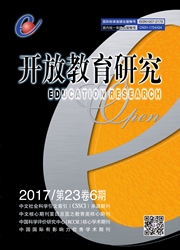

 中文摘要:
中文摘要:
在基于项目的协作情境下,学习者之间存在复杂的合作与竞争关系,因此只有同时考虑知识共享者和知识接受者双方的付出与收益,才能合理地描述基于项目的在线协作知识共享过程,进而剖析多因素的作用机制。鉴于此,本研究以博弈论为基本分析工具,尝试从新的视角揭示学习者之间的相互作用关系和行为规律。论文从私下共享(一对一博弈)、组内共享(小范围博弈)、公开共享(开放式博弈)三方面建立了基于项目的在线协作知识共享博弈模型,剖析个体间协作知识共享的动态演化机制,针对每类模型分别描述了关键因子的作用和影响;通过对模型的比较,分析三类知识共享方式下博弈过程的差异,并据此提出促进知识共享的策略。本文所提出的知识共享模型可作为基本框架为后续研究提供参考。
 英文摘要:
英文摘要:
Knowledge sharing is the key process of online collaborative learning.Knowledge and experience sharing among learners can contribute to promoting a team's construction of knowledge,strengthening individuals ' knowledge internalization and social presence,and improving learners ' learning performance and satisfaction.However,in a project-based context,there are complex relationships between cooperation and competition among individual learners.Both can motivate individuals to strive for better achievements than their team members,and encouraging project teams to achieve their best performance.Deviation and contradiction between individual rationality and collective rationality often exists.Therefore,payments and benefits from sharers and receivers should be taken into consideration during online knowledge sharing,so that multiple factors about sharing mechanisms can be analyzed.In this paper,the characters about online collaboration knowledge sharing are first analyzed.The features include:1) It is probable that the value of knowledge will be increasingly added in the process of repeated production,transmission and application.2) Knowledge is recessive,exists in the human mind and is not easy to be occupied and used by other.As a result,the dynamic mechanism of knowledge sharing is very important.3) Knowledge owns the characteristics of public goods which are high production cost but low communication cost.4) The value of recessive knowledge from group members determines their core competitiveness in the groups.This research proposes a game model for project- based online collaboration knowledge sharing and illustrates game process in learners' online cooperation,and analyzes dynamic evolutionary mechanism on individual collaboration knowledge sharing.The model indicates that:1) Learners among private knowledge sharing have equal status and their sharing behaviors are not subject to supervision.Therefore,when their knowledge structures are complementary to each other and they can achieve prog
 同期刊论文项目
同期刊论文项目
 同项目期刊论文
同项目期刊论文
 期刊信息
期刊信息
